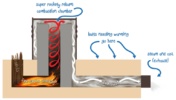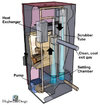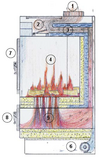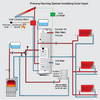I was around 2008 asked to make a web page saying how bad wood burners are for the environment, I felt step one was some research, and he was correct for some wood burners, the problem lies in particular emissions, it seems if the fire is not hot enough, then it can send out these particular emissions, and only real way to stop them is add air after the first burn to ensure all fuel is used.
This produced a second problem, the fire needs to burn at a set rate, too high and heat going out of the flue, too low and one gets the particular emissions. So a series of wood burners have been designed to fully burn the wood, but as part of it there is a need to store the heat, so you can burn at set rate, but not all the heat is released at that time.
The DIY model

is built with a rock or concrete seat which stores the heat, note near horizontal flue, as it is condensing so water needs to be able to run out, look up rocket wood burner to learn more, not sure what insurance companies would say? Another condensing wood burner here

I looked at it and emailed to find out what safety system there is for a power cut, as it clearly relies on having power to it. I got no answer. But some are not so complex this one

does again rely on electric, but it would seem one could at least rake out the fire, and today with solar power and the battery which goes with it I do have an UPS supply. (uninterruptible power supply)
The main idea however is hinged around storing the heat, I have seen one house with this sort of setup,

due to wanting not to rely on electric power, the water tanks were on the first floor, they were around 100 gallon each, and it worked well, my brother-in-law could visit his daughters in Germany and on return in the airport set the heating higher again, and the solar was enough to keep his house warm while away to stop freezing, and able to reheat the house for his return.
When at home a fire in the evening was enough to keep home warm all day, it would be lit and allowed to burn out. And the system allowed him to use electric or LPG if he did not want to light a fire, all heating the same set of radiators, it was an A1 system.
However when he moved, and looked in to having same system in new home, he was told the cost of building the floor to take the weight of 200 gallons of water, etc. It would cost around the £25k mark to install it. And that's the problem.
The clean air act it seems is not nation wide, it depends where you live as to if a smokeless zone or not, and it does need some one to complain. I do have an open fire, and I have got wood I can burn, but I have never to date lit a fire, it is for emergency only. As to if I need emergency heating not sure, it would depend on when we got a power cut, my solar panels and battery if the power cut happens when batteries fully charged would likely last forever, unless we got a few dark days, but if it was to fail at midnight with only 10% battery left, then unlikely it would last the night.
So the grate remains, for the emergency. But there is a huge difference with emergency use, to daily use. And if the neighbours complain I can see how some one using an emergency fire daily could get stopped. I have not seen a home in years where open fires are their only heating, B&Q and the likes use to sell cheap emergency fires, but not seen them for a very long time. I can't see any council official stopping one using solid fuel fires during a power cut.
However I remember around 1966 going to Warrington on my scooter with my mum and dad in their car, and around the river Weaver I had to guide my dad as he could not see the curb, I have not seen smog like that for many years, but with the price of oil, gas, and electric raising I can see people trying to save money by burning wood. Unless you know what the wood is that can be dangerous, cut in the wood pile, could you identify lilac, which if burn is deadly poison.





